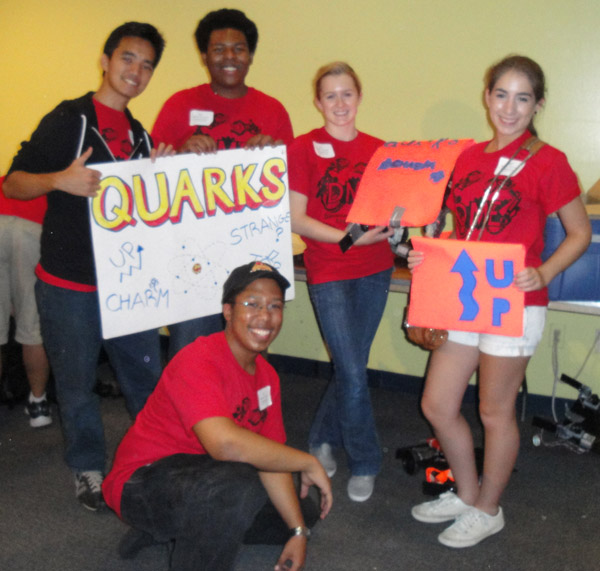

Discover Mechanical Engineering is a week-long program that exposes freshmen to various aspects of Mechanical Engineering, such as research and manufacturing. In 2010, I was a mentor for this program.
Shortly before I began my freshman year at MIT, I participated in a Freshman Pre-Orientation Program (FPOP) called Discover Mechanical Engineering (DME). DME is a week-long FPOP that allows interested freshmen to explore several aspects of mechanical engineering at MIT. They get to learn about different MechE labs and machine shops. They also get a hands-on introduction to machine tools by building a robot that will compete in a soccer match that takes place at the Boston Museum of Science.
DME 2008 was a lot of fun for me. I came to MIT with a strong interest in Mechanical Engineering and DME strengthened it. I was excited to build a robot in a week and to get to know other freshmen who were interested in mechanical engineering. The robot that we built for DME 2008 was pretty interesting. Instead of just giving us motors to power our drive wheels, we had to take apart and hack a cordless drill. The batteries for the drill powered the wheels. There was a lot of soldering and hacking, which I thought was pretty cool. However, they’ve had the same design since at least 2006, and the wireless control boxes DME used year after year had taken a lot of abuse. Also, me and several other people had a hard time controlling the robots because the drill motors were so fast. It was a lot of people just ramming into the walls of the field and each other.
Since I had so much fun in DME 2008, I decided to come back and help out with DME 2009. I couldn’t be a mentor because I hadn’t taken 2.007 yet, so I worked as a member of the Run-Time Staff. Run-time does a lot of behind the scenes work. For the meals (breakfast, lunch, and dinner), the run-time staff either cooks the food themselves or they coordinate the ordering of the food. Furthermore, they prepare the set-up before the meal and the clean-up after the meal. They also help out with the lab: getting supplies, testing controllers, and being the second line of defense after the mentors to make sure that the students don’t cut off their hands. Despite how it sounds, it was actually pretty fun. The run-time staff signed up for events to work on, so we didn’t have to be there all day. In fact, I would sign up for a couple of events, and then go work in the Hobby Shop on my Jenga Pistol (I finished it right at the end of DME). I wasn’t there much in the lab, but one of the coordinators redesigned the robot so that it focused more on electronics; the students got to program a micro-controller to move servo motors. The robots were small and dinky. However, I do think it was a step in the right direction.
After the success of DME 2009, I decided to come back yet again, this time as a mentor for DME 2010. As far as I could tell, the mentors just sat around and made sure that the students were following safety procedures. It seemed pretty chill. But of course, as I learned as a MITES TA, not everything is what it seems. It turned out to be more work than being on run-time staff, which stands to reason because run-time staff signs up for shifts, but mentors have to be there all day. Breakfast was at 8AM and they started machining at 9. Then there was some special lunch, with MIT faculty or at Design Continuum, etc. Then there was more robot building until around 5 (the shop guys at Pappalardo were really strict about leaving right at 5). Then there was dinner from 6-7. Then there was some social activity, from dodgeball to capture the flag to a Boston scavenger hunt. So, in summary, I would leave my dorm at 7:30am and return at 11pm for six days. It was exhausting. It was also a lot of fun. I had a great time. Also, the coordinator (a DME ’08 alum and my former roommate) decided to return to the old, big hackerbot from 2008. The robots were pretty robust, but the wireless control boxes were really big and old and they barely worked.
In 2011, I plan to come back to DME, at least as a mentor. I wouldn’t mind being a coordinator, and responsibilities aside, I’d really like to redesign the robots. The old 2008 robots served their purpose, and I really like the idea of hacking a drill to use its motor, but the control boxes are ancient. Likewise, I think that the servo motors and micro-controllers was a great step in the right direction, but there was too much focus on electronics and not enough focus on robust machine design. Hopefully, I can get the best of both worlds with a new design: a robot that is robust and with working controllers. I’ll keep you posted.